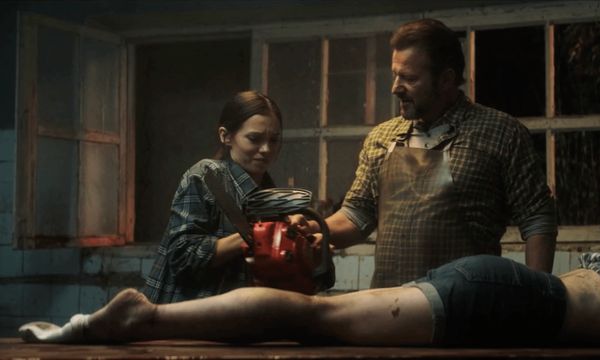Eye For Film >> Movies >> Daddy's Girl (2018) Film Review
Daddy's Girl
Reviewed by: Jennie Kermode

How much responsibility does a woman in her late twenties bear if she covers up for the fact that the man in her life is a serial killer, and even helps him? Does it make a difference if that man is her father and has been abusing her since she was a child? Zoe (Jemma Dallender) has always been Daddy's girl, with no-one else to turn to since the death of her mother. Although she gets a small measure of autonomy and even gets her hands on a gun from time to time, she struggles to understand that there's a life beyond what he has taught her, and to find a way out.
Daddy (Costas Mandylor) makes a mistake when he returns to the town where Zoe grew up. Young police deputy Scott (Jesse Moss) recognises him and gradually figures out that something is wrong. He becomes determined to help Zoe. But this is a film that's alert to the problematic nature of damsel in distress narratives. The question of Zoe's complicity remains pertinent throughout. Scott has to reconcile himself to the fact that straightforward heroics are not always the answer. And he's not the only one to take an interest in Zoe's plight, with a female vigilante also becoming determined to find out more. Caught as she is between these three influences, it's unclear if Zoe ever really has a chance to determine her own course in life, or if she really has a fully developed moral compass that isn't just temporarily borrowed.
Given its subject matter, the film inevitably contains scenes of torture, violence and rape. It's to director Julian Richards' credit that, whilst delivering on horror, he never eroticises these. We see very little naked flesh and when Zoe is in bed with her father the focus is on her disinterest and misery. Though the two flirt with young women they meet in bars and the chemistry that persuades them to hook up is believable, the atmosphere changes completely once the victims comprehend what's going to happen to them. There are suggestions that Daddy is religiously motivated - fear of hellfire is part of what keeps Zoe in line - and his use of Biblically-inspired excuses for vicious behaviour that he obviously enjoys gives the film a topical edge that is enhanced with the theme of vigilantism. It's likely no coincidence that it's a female colleague of Scott's who points out how poorly equipped the law is to help people in Zoe's situation.
Hollyoaks alumnus Dallender makes an impressively ambiguous lead, showing the intensity of emotion that we need to see Zoe as more than a simple accomplice, yet never entirely excusing her. It's unclear how much her own violent behaviour is reaction, how much imitation; unclear whether it is heroic or self-serving. Perhaps it's all these things. This complexity also invites us to question the true motives of the police officer and the vigilante, each of whom is delineated in familiar terms which might stem from lazy writing or might be deliberately presenting a challenge to viewers, inviting us to explore beyond the boundaries of our comfort zones.
That it is comfortable to adhere to the familiar, no matter how problematic it may be, seems to explain some of Zoe's loyalty to her father. He presents her with rules and routine. There is no implication that she loves him but she clearly likes to lease him and feels bad when she breaks the rules. His forgiveness supplies the kind of positive reinforcement that becomes all the more important to people who spend long periods of time in predominantly negative environments.
For all that it might be accused of exploitation, Daddy's Girl is a surprisingly astute exploration of domestic abuse and the way damage passed through generations can manifest in different ways. It's an effective little thriller and a challenge to genre conventions.
Reviewed on: 03 Oct 2018
















